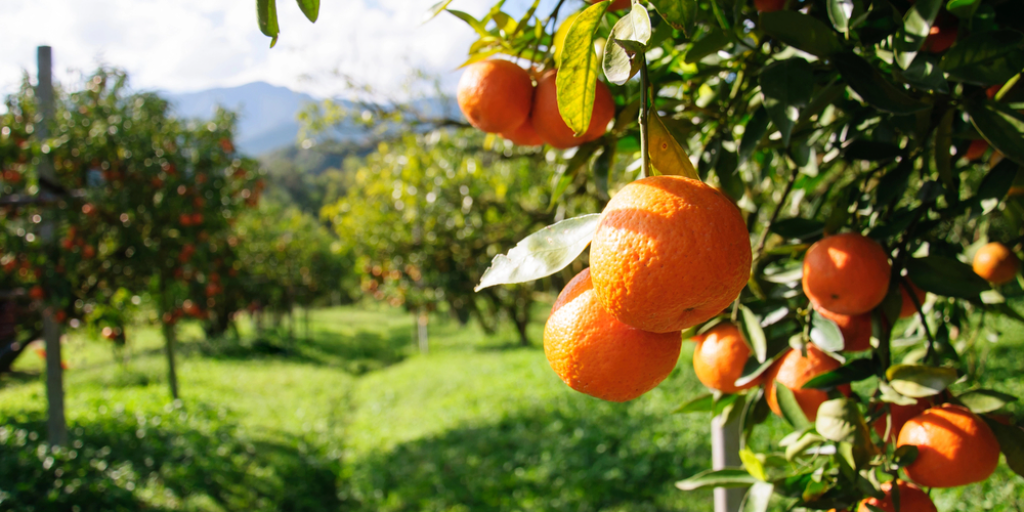The world’s most popular juice drink is a lot more expensive this year: here’s how orange juice gets to your breakfast table, and here’s why it costs so much this year
Lesson summary
Hi there everyone, I’m Jeff and this is Plain English, where we help you upgrade your English with stories about current events and trending topics. Listen here and you’ll hear a lot of English words and phrases, about things you might not encounter otherwise . And of course in the second half of every lesson, we talk about a common English expression or phrasal verb.
Today’s story: OJ, orange juice. It’s the most popular fruit drink in the world. But the last few years have not been good to Brazil and Florida, the world’s biggest orange-growing regions. And that’s affecting prices in supermarkets around the world. We’ll take a tour through how a glass of orange juice makes it to your breakfast table…and what might happen if these prices stay high.
In the second half of today’s lesson, I’ll show you how to use the English word “worthwhile.” It’s a single word, but it’s a good one to know how to use. Worthwhile.
The full lesson—the transcript, quiz, and exercises—it’s all at PlainEnglish.com/686.
Bad harvest threatens orange juice markets
The orange is the world’s most popular fruit. It originated in Southeast Asia. Early traders brought it to the Caribbean in 1493. There are several varieties of oranges, but they all grow in tropical locations.
Brazil is by far the biggest producer of oranges: over half the world’s oranges come from Brazil. The U.S. is second, with growing regions in Florida and California. Mexico, southern Europe, China, Israel, and South Africa grow small amounts of oranges.
Orange juice is the world’s most popular juice drink. About a third of the oranges grown each year are processed into juice. The U.S., Canada, U.K., and Europe are the biggest markets for orange juice. Two-thirds of American households buy orange juice.
For many of us, orange juice is something we take for granted : we assume that there will always be fresh OJ in the refrigerated section of the grocery store and in restaurants. But oranges have a short growing season. An elaborate, international supply chain keeps our refrigerators stocked year-round.
Most consumers in Europe and Asia drink juice that has been concentrated. Juice producers, primarily in Brazil, concentrate the juice by evaporating some of the water in it. This concentrate can be frozen and then shipped to international markets.
Shipping the frozen, concentrated juice is cost-efficient. There are specialized tanker cars on trains, specialized trucks, and specialized oceangoing ships to handle concentrated orange juice. Processors at the receiving ports then convert the concentrated juice into a product that can be packaged and ready to drink.
Consumers in the U.S. and Canada are lucky, though. They primarily drink juice that is “not from concentrate.” That means, it has never been evaporated. It’s more expensive to ship that way, but it doesn’t have to go a long distance, since it comes from Florida and can go over the road.
Whether from concentrate or not, orange juice is stored so that demand can be met throughout the year.
But right now, the orange juice industry is in turmoil. This year’s orange harvest in Brazil is a quarter lower than last year’s. It’s one of the worst harvests in over thirty years. Florida’s production is about flat from last year—but last year was a low-production year. Harvests in Mexico and Spain are both down about 30 percent from recent years.
The reasons are varied. Mexico and Spain have suffered droughts. Brazil suffered an intense heat wave between September and November last year, right when fruit trees were flowering: that hampered production. Florida’s crop was partially destroyed by hurricanes, but it also suffers from a citrus tree disease.
All this means that bulk , international orange juice prices are at record highs. And this comes after a punishing few years of inflation that have raised costs of shipping, packaging, labor, and storage—all of which also have pushed juice prices higher at the grocery store. At some point, consumers won’t be willing or able to pay such high prices. So what might happen then?
Some juice makers might shift to lower-quality blends. Some producers might mix different citrus fruits, like mandarins, into their orange juice blends. Other juice companies might try to sell more juice cocktail—blends of multiple fruits, including grapes and apples, which are more plentiful.
The big question for orange growers is this: should they plant more orange trees? Planting a new fruit tree is a long-term commitment. Farmers have to care for orange trees for a few years before the trees bear even a single piece of fruit. An orange tree matures only after ten years. And in a punishing and changing climate, some farmers will wonder whether that’s a worthwhile investment in the long run, if the harvest is uncertain.
Jeff’s take
I remember as a kid, we sometimes had concentrated orange juice in the freezer. It was awful. It came in a small can. And you had to mix the frozen concentrate with 3 cans of water. It just tasted fake. That stuff has all but disappeared. I wonder if you can still get it? The quality now is so much better than it was years ago—but still nothing in the grocery store can compare to juice that is fresh squeezed.
Where I live in Mexico, fresh-squeezed juice is very, very common. I can walk a block north or a block south from my apartment and buy orange juice squeezed that moment. Nothing beats orange juice that way—no storage tank required.
Learn English the way it’s really spoken

